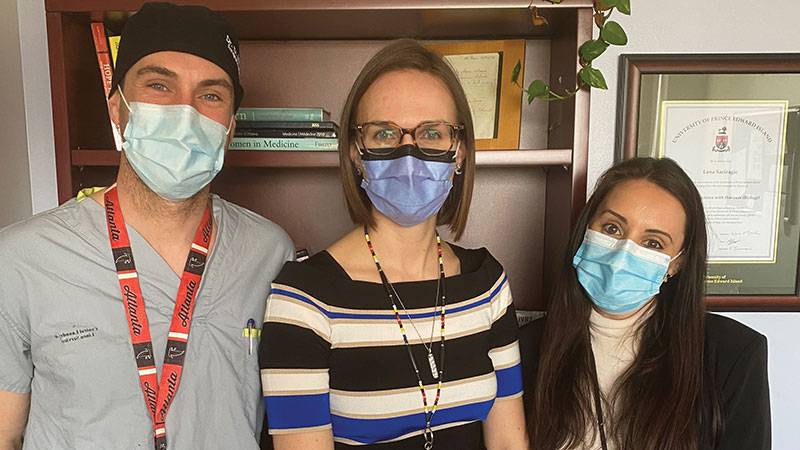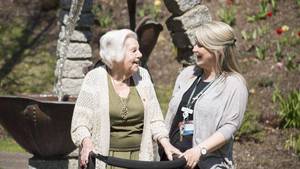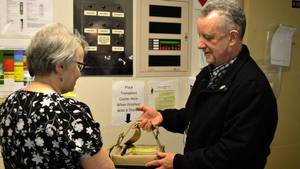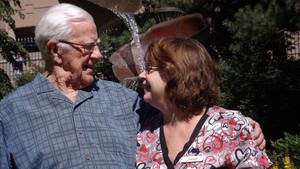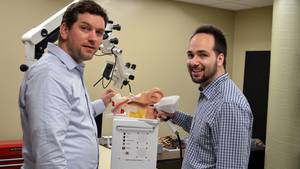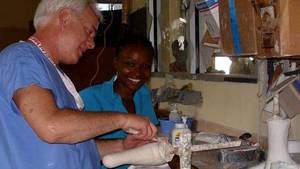Marjory Masson did not spend her 63rd birthday in hospital. Thanks to a program designed to enhance patient recovery after surgery, she was able to return home to celebrate her special day just three days after undergoing a major operation to remove a growth on her left ovary.
“I was walking up and down the hall in the hospital before I went home,” says Marjory, a retiree living in Halifax. “I was surprised that I felt as good as I did.”
Marjory credits the gynecologic oncology team at the QEII Health Sciences Centre not only for her speedy recovery but also for educating her at every step of the way, from diagnosis to the weeks leading up to surgery. She knew what to do and what to expect because her gynecologic oncologist gave her a booklet that outlined everything.
The booklet, or passport, that Marjory received is an essential part of the Enhanced Recovery After Surgery (ERAS®) program, which provides a set of standardized guidelines for both patients and healthcare providers to follow before, during, and after surgery.
The ERAS® program is used in healthcare centres worldwide and has helped patients recover better and faster through post-operative care. It results in less time in hospital, fewer complications and more savings to the healthcare system, says Dr. Lana Šačiragić, a gynecologic oncologist at the QEII.
“We’re all working together,” says Dr. Šačiragić. “Getting people to understand the important role they can play in their own recovery is empowering.”
Dr. Šačiragić and the QEII’s gynecologic oncology team received a $60,000 QEII Foundation Translating Research Into Care (TRIC) grant for their study, GO TIME! Transforming Care and Improving Quality in Gynecologic Oncology (GO) with Implementation of an Enhanced Recovery Program.
With the grant, the team can provide ERAS® care for the 400 to 500 women from Nova Scotia and P.E.I. who need gynecologic oncology surgery each year.
“Everybody who is having major surgery in gynecologic oncology is part of the program,” says Dr. Šačiragić.
In June 2021, the first patient enrolled in the QEII study, which will continue until 2023. The QEII’s gynecologic oncology team will collect data from the study to continue improving care. Dr. Šačiragić is confident that the care will continue after the study ends because it has proven to enhance patient care worldwide, and has become integrated into clinical practice.
Navanna Pelletier, a clinical nurse educator at the QEII, agrees.
“We are getting the patients to recover quicker and get home to their families faster,” she says.
One of the post-op guidelines that ERAS® provides is that patients move soon after leaving the operating room.
“The goal is for the patient to walk a total of 2 hours, standing at the bedside, sitting up in the chair and walking to the doorway and back on the same day following their surgery. That activity goal increases with each day,” says Navanna. “In the past, it might have been a day or two of lying in bed.”
Twenty years ago, a surgery patient would have been bedridden for days, had a catheter and IV, and told not to eat. Recent research has shown that this is not best for the body.
“Now we remove their catheter as soon as possible,” says Dr. Šačiragić. “ERAS® promotes physiological recovery as soon as possible. It is standardizing care and making sure that everyone is on the same page. That is what makes the difference.”
ERAS® guidelines also encourage patients to eat immediately after surgery.
Gynecologic oncology is the first surgical program in Nova Scotia to comprehensively implement and study the ERAS® program. The team has gained support from surgeons, nurses, anesthesiologists, physiotherapists, occupational therapists, and nutritionists, says Dr. Šačiragić. She is hopeful other surgical programs will follow their lead.
“There are a lot of benefits to be gained,” she says. “Getting someone out of the hospital earlier and leaving feeling better with less risk of coming back is a huge gain for the healthcare system.”
QEII Foundation TRIC grants are donor-funded and help provide the resources needed to turn science and theory-based ideas into innovative clinical practice. The goal is always to improve patient care and reduce wait times.

